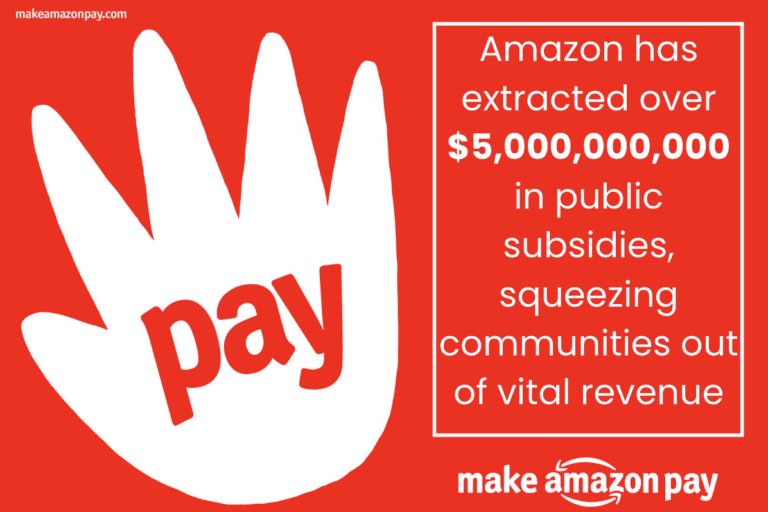“Make Amazon Pay” Globally by Ending Its Subsidies
by Good Jobs First
Amazon.com, Inc. has squeezed more than $5.1 billion from U.S. states and localities in economic development subsidies. This is according to subsidy watchdog Good Jobs First, which posted recent tax-break data at its Amazon Tracker database documenting hundreds of incentive deals given to the retail giant.
Amazon has also continued to reap subsidies around the world, as first documented by Good Jobs First last February. While the costs of those non-U.S. deals are less-well disclosed, Good Jobs First noted likely new subsidies since February given to the company in Germany, Sweden, and the United Kingdom.
Good Jobs First released the new findings as part of the global “Make Amazon Pay” campaign featuring events in many nations on Black Friday (November 25).
Most of the U.S. subsidy packages are for warehouses, even though Amazon’s rapid-delivery Prime business model compels it to build hundreds of such facilities close to affluent communities. Amazon also recently announced it will lay off thousands of workers and cancel some of its distribution expansion plans, admitting it overbuilt.
While the company has failed to sign its first collective bargaining agreement with warehouse workers who have voted to unionize, Amazon founder Jeff Bezos is scrubbing his image with charitable-giving announcements.
“Governments are wasting huge sums subsidizing Amazon even as the pandemic drove record growth for the company, and repeated exposés have shown the deplorable working conditions of its warehouse workers and the power it has to drive small businesses out of the marketplace,” said Good Jobs First Senior Research Analyst Kasia Tarczynska, who maintains Amazon Tracker. “Amazon must stop squeezing communities.”
“Working families want justice, not charity, from Amazon,” said Greg LeRoy, Good Jobs First’s executive director. “That means paying taxes like everyone else — with no subsidy tax breaks — and recognizing workers with a bona fide union contract.”
Within the last two years:
- Amazon received one of its biggest packages ever in Niagara County, New York. In exchange for $124 million, Amazon promised to create 950 jobs paying roughly the county’s minimum wage when the warehouse opens: $15 an hour. The jobs, per the agreement, can be part-time or contract workers employed by temp agencies.
- Blount County, Tennessee, committed $12 million for road improvements necessitated by an Amazon warehouse. Amazon will make payments for that work via a Payment in Lieu of Taxes agreement, over the next 20 years, instead of paying property taxes that would have gone to educate kids, maintain parks, help veterans, or beef up workforce development. (The County did not disclose Amazon as the beneficiary of this deal until after approval, and local development officials erroneously claimed Amazon was getting no subsidies).
- A developer that will house an Amazon warehouse is benefiting from a tax increment financing (TIF) deal that will lower its costs by $1.8 million in Charlton, Massachusetts. Per the state, “TIF benefits are expected to be passed through to Amazon who will be creating 1,000 jobs.” The through-payment, which means Amazon is likely paying reduced rent, is another common, back-door tactic used by Amazon.
- Not content with Morrow County, Oregon’s lack of sales tax, its cheap power, and bountiful water and land, Amazon got over $51 million for data centers there in 2022. Cloud-computing server farms produce very few permanent jobs. Yet since 2015, Good Jobs First has documented over $224 million in Amazon data center subsidies in Morrow County (voters rejected a school bond in spring 2022, in part because of resentment by voters who felt they were subsidizing Amazon’s free ride, the Oregonian reported).
- Somewhere in Pennsylvania (poor transparency means the public doesn’t know where), Amazon got nearly $4.5 million in film subsidies. Expect more of these now in the wake of its acquisition of MGM.
Instead of Amazon squeezing workers, the company should pay living wages and stop its aggressive, even illegal responses to organizing efforts.
Instead of squeezing the planet – its carbon dioxide emissions in 2021 were the equivalent of 180 gas-powered plants, the Verge reported – Amazon must work to take meaningful action on climate change.
And instead of squeezing communities for every dime, Amazon should pay them when it arrives, for roads, schools, parks, environmental mitigation and everything else other residents and other businesses already pay for.
Bottom line: Instead of celebrating a man’s dubious pledge to cherry-pick charitable causes, let’s work to build an economy that properly rewards workers and their support systems for the riches they create and enable.
